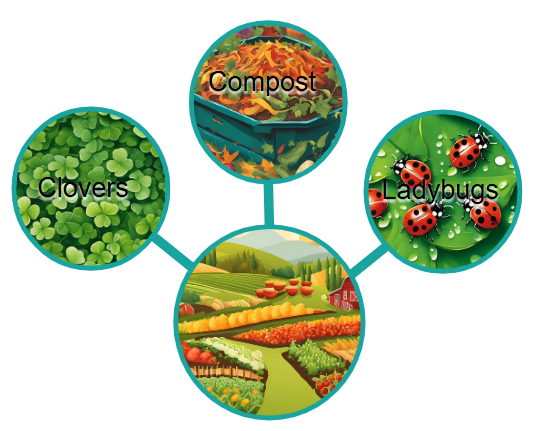P1W7: Food Choices
backWhat is Organic Farming?
Organic farming is a way of growing food naturally, without using chemicals like synthetic pesticides and fertilisers. Instead, organic farmers use things found in nature, like compost and natural minerals, to help plants grow strong and healthy. In fact they follow the old, traditional way to produce fruits and vegetables.
 |
|
While industrial farms often use chemicals and large machines to produce lots of food quickly, organic farms focus on quality and caring for the environment. Organic farms avoid harsh chemicals, instead, plants, animals, and insects all work together.
Think of industrial farming as fast food — it’s quick, but not always the healthiest choice. Organic farming is more like a home-cooked meal. It might take a bit longer, but it’s often healthier and better for everyone.
Organic farming is better for the planet because it:
- Protects the Soil: Using natural fertilisers keeps the soil rich and healthy. Healthier soil means more nutritious food.
- Reduces Pollution: Without chemical sprays, fewer harmful substances get into the soil and water.
- Encourages Wildlife: Organic farms attract bees, butterflies, and birds, which are essential for pollinating plants.
- Healthier Food: Organic fruits and vegetables aren’t sprayed with synthetic chemicals, which can be healthier to eat.
- Safer for Farmers: Farmers working on organic farms aren’t exposed to harmful chemicals, which can help them stay healthier.
|
Supports Local Farms: Organic farms are often smaller and located closer to cities and communities, which helps support local food systems. |
-
Questions:1
10Time left:0CorrectIncorrect -
Questions:2
10Time left:0CorrectIncorrect -
Questions:3
10Time left:0CorrectIncorrect -
Questions:4
10Time left:0CorrectIncorrect -
Questions:5
10Time left:0CorrectIncorrect -
Questions:6
10Time left:0CorrectIncorrect -
Questions:7
10Time left:07. Question
If you start a small garden at home, what might you use instead of chemical fertilisers?
CorrectIncorrect -
Questions:8
10Time left:08. Question
What are the main differences between organic farming and industrial farming?
Select three.
CorrectIncorrect -
Questions:9
10Time left:0CorrectIncorrect -
Questions:10
10Time left:0CorrectIncorrect
Summary
0 of 10 questions completed
Questions:
Information
You have already completed the quiz before. Hence you can not start it again.
Quiz is loading…
You must sign in or sign up to start the quiz.
You have to pass the previous Module’s quiz in order to start this quiz:
Results
you have successfully completed the quiz.
Summary
You have passed the quiz.
Try your best next time.
Questionnaire
- 01
- 02
- 03
- 04
- 05
- 06
- 07
- 08
- 09
- 10
- Answered
- Review
